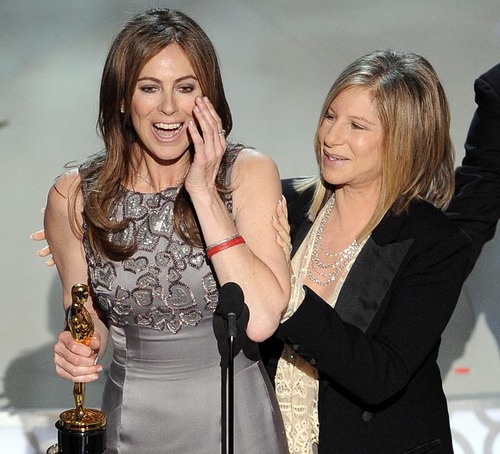I said just about everything I had to say about the Oscars in a dozen or so tweets I filed the evening of the broadcast, in between juggling manual updates for a couple of stories on RogerEbert.com (including Roger’s live-tweets of the show) and approving Oscar comments on Roger’s blog. I think I got out of my chair two or three times between 3:30pm and 9:30pm PST.
So, yeah, I made a few observations — like this:
Instead of playing “I Am Woman” after Kathryn Bigelow‘s win, why didn’t they play “Papa Can You Hear Me?” for Babs? #oscars
And this:
Elinor Burkett’s Oscar performance marks the official arrival of the word “Kanye” (or “Kanyed”) as a verb. http://j.mp/9XIwqy #oscars
And this:
Has “Based on the Novel Push by Sapphire” become the new “Electric Boogaloo”?
Not to mention this:
Clip from TDK shows its action-movie flaws. Poor spatial correlation between shots. As cut, Joker’s bazooka should have hit van. #oscars
And this:
What an insult. AVATAR has nothing to do with cinematography — light through a lens. It’s pixels on a screen.
I’m working on a longer post about that last item, examining our definition of “cinematography” in the age of digital post-production, and the Academy’s rules regarding cinematography and animation. But in the meantime, I came across a few other takes on the evening that I thought were provocative or intriguing enough to share with you.
Producer Ted Hope (“Adventureland,” “American Splendor,” “In the Bedroom“) wrote at Salon.com:
There should be a semiotics class devoted to the moment when Kathryn Bigelow won best director. First Barbra Streisand hogged the spotlight by not announcing Bigelow’s name but instead taking the moment for herself to announce that history had been made. And then the show’s directors had the gall to play “I Am Woman, Hear Me Roar” in the background?! I guess they wanted to show they had balls. She so deserved it, they knew she would win, and they come up with something “cute” and antiquated to comment on it? I may be an old white straight guy, but the show gave my group a bad name.
(They also played “Thank Heaven for Little Girls” when “An Education” star Carey Mulligan and Amanda Seyfried [who?] came out to present. Given the subject of “An Education,” I was moved to tweet: “Appropriate? Or Inappropriate?”)
And Marshall Fine waited until Wednesday to post his take on one of the evening’s longer segments, “Annals of the Over-rated: John Hughes,” in which he said he’d made a vow not to
… complain that several recently deceased personalities – including Farrah Fawcett, James Whitmore and Bea Arthur [and Henry Gibson] – were skipped over in the maudlin memorial section of the show. Except that then the show’s producers devoted several precious minutes to a tribute to John Hughes.
John Hughes?
You’ve got to be kidding, right?
Yes, yes, I know – he’s a Gen-X (and even Gen-Y) god, the man who got teen-agers. But a lengthy retrospective of clips and a rogues’ gallery of former teen stars singing his praises?
Pardon me for breaking orthodoxy, but John Hughes was a mediocre director and prolific writer who wrote more than three dozen films and directed eight. And of those, there are about three that stand the test of time: “Sixteen Candles,” “The Breakfast Club” and “Ferris Bueller's Day Off.” Those are the three films in the Hughes’ oeuvre which, early on, had me convinced for a moment that Hughes was a genuine talent.
No matter what you think of Hughes’ never-nominated legacy (I think his best movie is the one that isn’t about teens: “Planes, Trains and Automobiles“), the Oscar show producers’ attempt to pander to a sorta-younger audience (not as young as Taylor Lautner, but significantly younger than Lauren Bacall) really was pretty blatant. The Hughes tribute was surpassed only by the kiddie-horror montage — highlighting as many BAD horror movies as good ones. There was no intelligence behind the clip selection.
By the way, I do not forgive the slighting of Henry Gibson, in particular: “The Long Goodbye,” “Nashville,” “The Blues Brothers,” “Innerspace,” “Magnolia“… He has 138 credits listed at IMDb, some of them as a regular on TV series (most recently “Boston Legal”). The man born James Bateman, and who adopted his stage name because he liked that it sounded like a certain Norwegian playwright if you said it fast, is a screen immortal.











